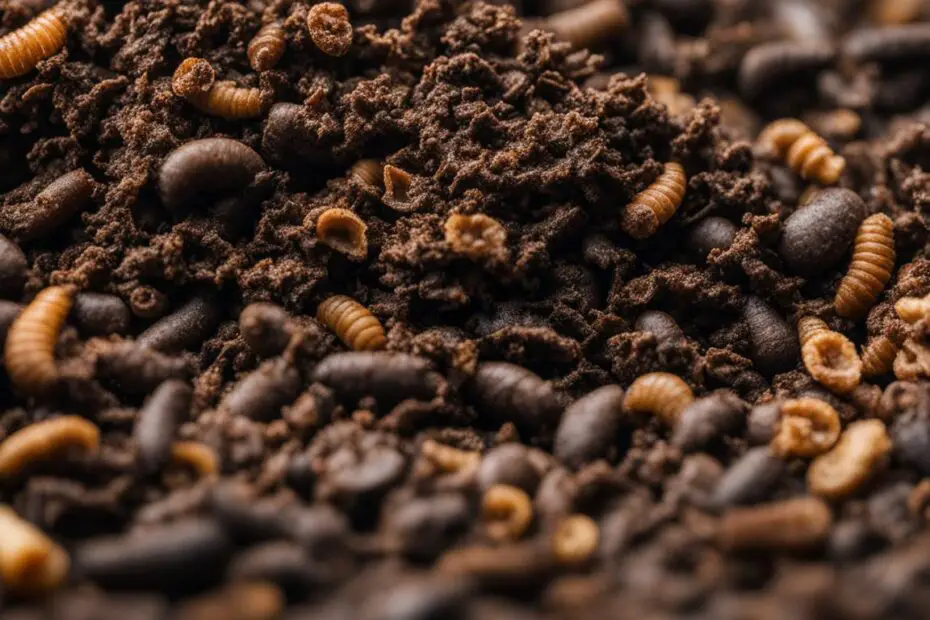Finding dead worms in your dog’s poop can be alarming, but it’s important to understand the causes and find solutions to address this issue. The presence of worms in dog stool is a sign of potential intestinal parasites. There are various types of worms that commonly affect dogs, including roundworms, tapeworms, hookworms, whipworms, and heartworms. These parasites can cause discomfort, health problems, and even pose risks to other dogs and humans.
To ensure your dog’s well-being and prevent the spread of parasites, it’s essential to take action. Regularly cleaning up your dog’s feces is crucial, as it helps prevent the transmission of worms. In addition to cleanliness, preventive measures such as routine deworming and flea control are necessary to protect your dog from further infestations. Consult with your veterinarian for personalized recommendations and proper treatment plans.
Key Takeaways
- Finding dead worms in your dog’s poop indicates the presence of intestinal parasites.
- Various types of worms can affect dogs, including roundworms, tapeworms, hookworms, whipworms, and heartworms.
- Worm infestations can cause symptoms such as diarrhea, abdominal pain, weight loss, vomiting, and poor coat appearance.
- Regularly cleaning up your dog’s feces and practicing preventive measures are crucial in addressing and preventing worm infestations.
- Consult with your veterinarian for personalized recommendations and treatment plans for your dog.
Types of Worms in Dogs
When it comes to worms that can affect dogs, there are several types to be aware of. Understanding the different worms and their characteristics can help you better protect your furry friend’s health. The most common types of worms that dogs can encounter include:
Roundworms
Roundworms are one of the most common intestinal parasites in dogs. They can easily be transmitted from one dog to another and even to humans. These worms can be found in the dog’s intestines and can cause various health issues if left untreated. Puppies are particularly vulnerable to roundworm infections, as they can be passed on from the mother either during birth or through milk.
Tapeworms
Tapeworms are acquired by dogs through the ingestion of infected fleas or by consuming wild animals infested with tapeworms. These worms can be easily identified by the small, rice-like segments they shed in the dog’s stool. While tapeworms are generally not life-threatening, they can cause discomfort and should be treated promptly to prevent them from spreading.
Hookworms
Hookworms are another type of intestinal parasite that commonly affects dogs. They can cause anemia in dogs, especially in puppies, by feeding on their blood. Hookworms can be transmitted to puppies from their mother during lactation and can also infect dogs through direct contact with contaminated soil. It’s important to regularly deworm dogs and practice good hygiene to prevent the spread of hookworm infections.
Whipworms
Whipworms reside in the cecum and colon of dogs and can be ingested through contact with contaminated substances such as soil, food, water, feces, or animal flesh. While mild cases may not cause noticeable symptoms, severe whipworm infestations can lead to inflammation, weight loss, diarrhea, and anemia. Proper sanitation practices and regular fecal exams are essential for detecting and addressing whipworm infections.
Heartworms
Heartworms are a particularly dangerous type of worm that can have severe health consequences for dogs. They are transmitted through the bite of infected mosquitoes and can cause severe lung disease and heart failure if left untreated. Preventive measures, such as regular heartworm testing and the use of heartworm preventive medications, are crucial for protecting dogs from this potentially deadly worm.
Understanding the types of worms that can affect dogs is essential for their overall well-being. Regular veterinary check-ups, fecal exams, and preventive measures can help ensure that your furry friend remains healthy and free from any worm infestations.
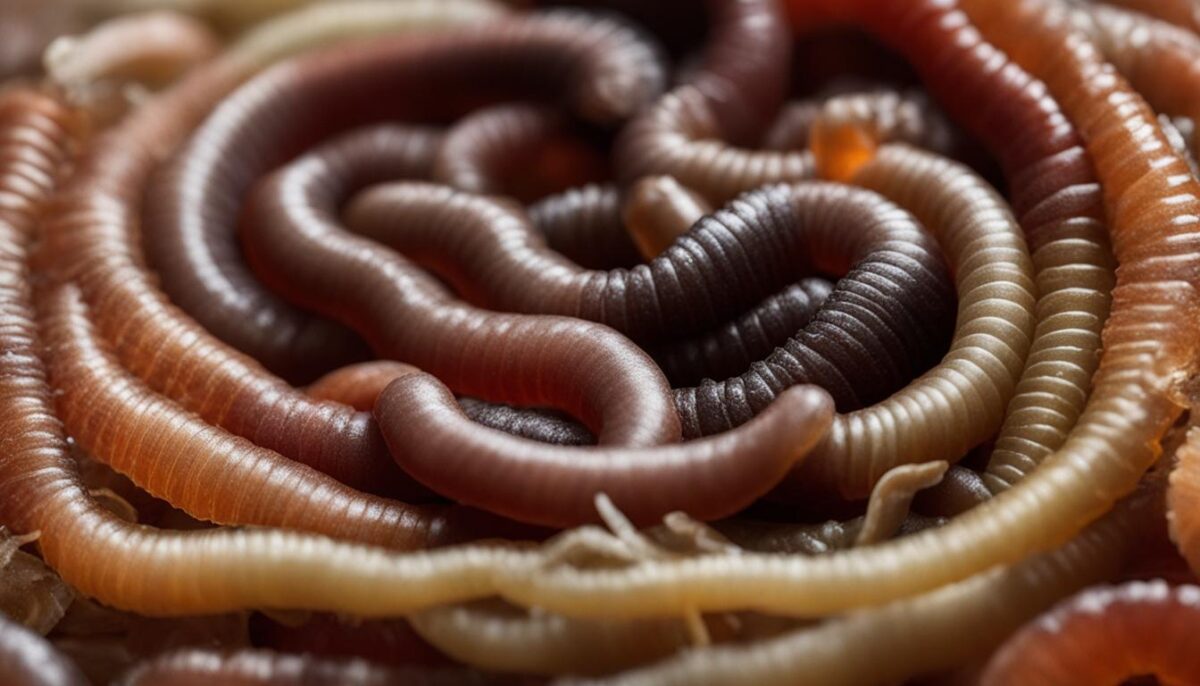
Symptoms of Worms in Dogs
Dogs can exhibit various symptoms when infected with worms. Identifying these symptoms is crucial for timely intervention and treatment. Common signs of worm infestation in dogs include:
- Diarrhea: Dogs may experience frequent loose stools, often with mucus or blood.
- Abdominal pain: Dogs may show signs of discomfort, such as restlessness or reluctance to move.
- Weight loss: Unexplained weight loss could indicate a worm infestation affecting nutrient absorption.
- Vomiting: Dogs may vomit or have bouts of nausea.
- Poor coat appearance: A dull, dry, or unkempt coat can be a symptom of worms.
- Pot-bellied appearance: Some dogs may develop a swollen or distended abdomen, known as a pot-bellied appearance.
- Lethargy: Dogs infected with worms may appear tired, weak, or lacking energy.
- Dehydration: In severe cases, worms can cause dehydration, leading to dry gums, sunken eyes, and decreased skin elasticity.
- Blood in stool: Worm infestations can cause bleeding in the digestive tract, leading to the presence of blood in the stool.
- Respiratory symptoms: In the case of heartworms, dogs may experience respiratory symptoms such as coughing, labored breathing, and weakness.
It’s important to note that not all dogs with worms will display symptoms. This makes regular testing and preventive measures essential to safeguard your furry companion’s health. Blood and fecal tests conducted by a veterinarian can help identify worm infestations even in the absence of symptoms.
Here is an informative table summarizing the symptoms of worms in dogs:
| Common Symptoms of Worms in Dogs | |
|---|---|
| Symptoms | Description |
| Diarrhea | Loose stools with mucus or blood |
| Abdominal pain | Restlessness or reluctance to move |
| Weight loss | Unexplained decrease in body weight |
| Vomiting | Bouts of nausea and vomiting |
| Poor coat appearance | Dull, dry, or unkempt coat |
| Pot-bellied appearance | Swollen or distended abdomen |
| Lethargy | Tiredness or lack of energy |
| Dehydration | Dry gums, sunken eyes, decreased skin elasticity |
| Blood in stool | Presence of blood in the stool |
| Respiratory symptoms | Coughing, labored breathing, weakness (heartworm infection) |
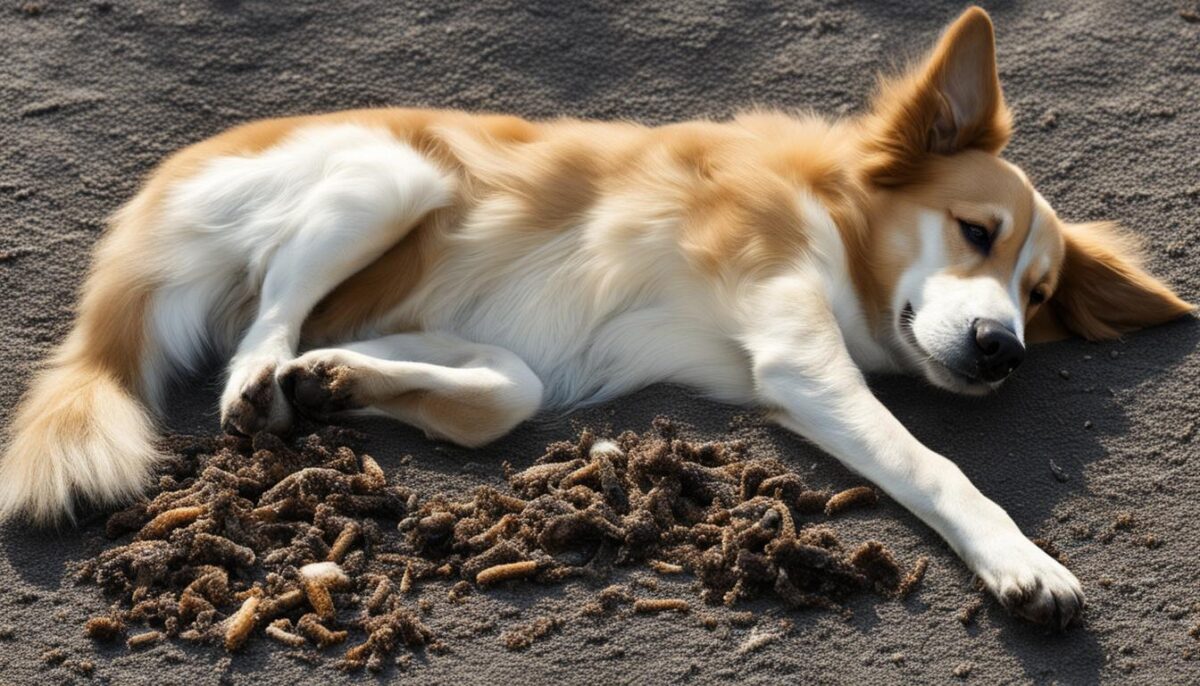
Roundworms in Dogs
Roundworms, including Toxocara canis and Toxascaris leonina, are common intestinal parasites that affect dogs, particularly puppies. Puppies can acquire roundworm infections from their mother or through ingestion of contaminated substances. If left untreated, roundworms can cause poor growth and even death in severe cases.
Raccoon roundworm, also known as Baylisascaris procyonis, is a rare type of roundworm that can infect dogs. It is typically contracted by dogs through contact with raccoon feces or contaminated environments. Raccoon roundworm infections can lead to neurological complications and can be dangerous for both dogs and humans.
To diagnose roundworm infections, veterinarians often require a fecal sample from the infected dog. Fecal samples can help identify the presence of roundworm eggs and determine the appropriate treatment plan.
Administering deworming medications is crucial for treating roundworm infections in dogs. These medications target and eliminate the adult worms, preventing further complications and transmission to other animals or humans. It is important to follow your veterinarian’s instructions regarding deworming medications and prevention strategies.
Regular fecal samples are recommended to detect and treat roundworm infestations in dogs. By staying proactive in monitoring and treating intestinal parasites, you can protect the health and well-being of your furry companion.
Roundworms in Dogs: Key Points
- Roundworms are common in dogs, especially in puppies.
- Dogs can acquire roundworms from their mother or contaminated environments.
- Raccoon roundworm is a rare type of roundworm that can infect dogs and humans.
- Fecal samples are used to diagnose roundworm infections in dogs.
- Deworming medications are necessary to treat roundworm infestations.
- Regular fecal samples help detect and address roundworm infections promptly.
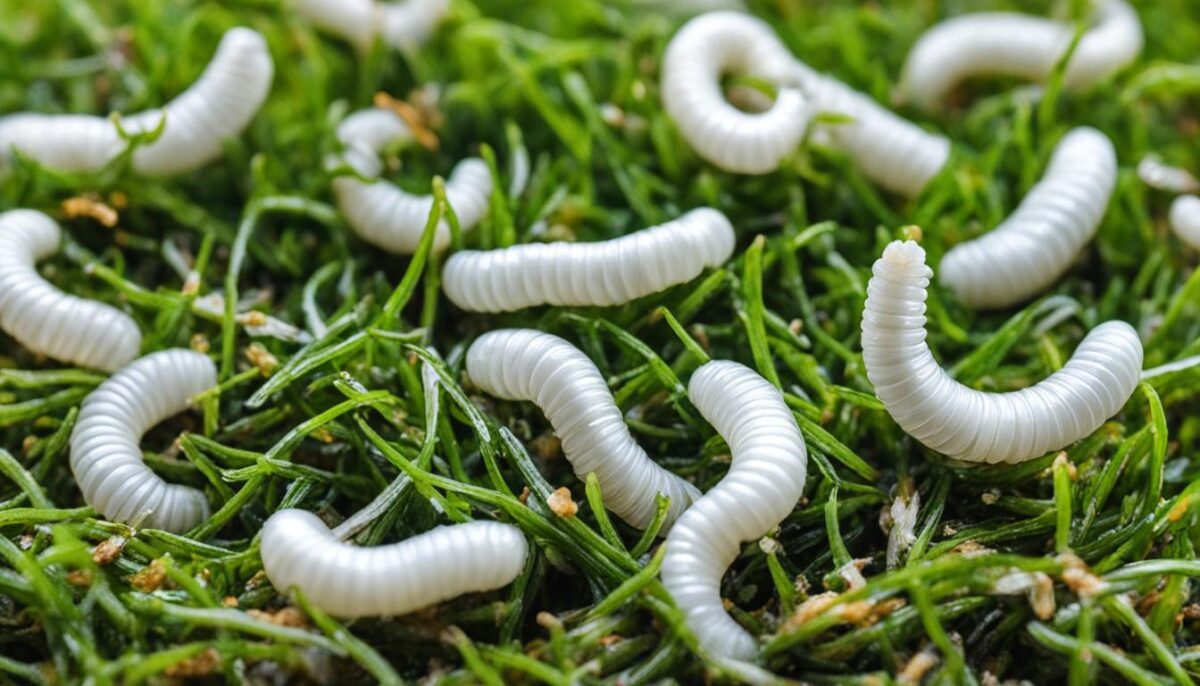
| Type of Roundworm | Scientific Name |
|---|---|
| Toxocara canis | Canine roundworm |
| Toxascaris leonina | Canine roundworm |
| Baylisascaris procyonis | Raccoon roundworm |
Tapeworms in Dogs
Tapeworms are a common type of intestinal parasite that can affect dogs. They are acquired when dogs ingest infected fleas or consume wild animals infested with tapeworms. One specific type of tapeworm that affects dogs is Dipylidium caninum.
One of the key signs of tapeworm infestation in dogs is the presence of tapeworm segments in their stool. These segments often resemble small pieces of rice and can be seen in the feces or around the dog’s anal area.
When it comes to treating tapeworms in dogs, it is important to address both the tapeworm infection and any underlying flea infestations. Eliminating fleas from the dog and their environment is crucial to prevent re-infection.
Treatment for tapeworms typically involves:
- Administering a specific deworming medication that targets tapeworms
- Ensuring that all fleas on the dog are eliminated through flea prevention medications
If you suspect that your dog may have tapeworms, it is recommended to take a stool sample to your veterinarian for diagnosis and treatment recommendations. The veterinarian will be able to confirm the presence of tapeworms and prescribe an appropriate treatment regimen.
| Signs of Tapeworms in Dogs | Treatment |
|---|---|
| Presence of tapeworm segments in the dog’s stool | Administer specific deworming medication targeting tapeworms |
| Itching or irritation around the dog’s anal area | Eliminate fleas through flea prevention medications and treating the dog’s environment |
| Weight loss or poor appetite | Ensure adequate nutrition and monitor the dog’s health during treatment |
Regular flea prevention measures and routine stool sample analysis can help prevent and detect tapeworm infections in dogs. It is important to consult with a veterinarian for personalized advice and treatment options tailored to your dog’s specific needs.
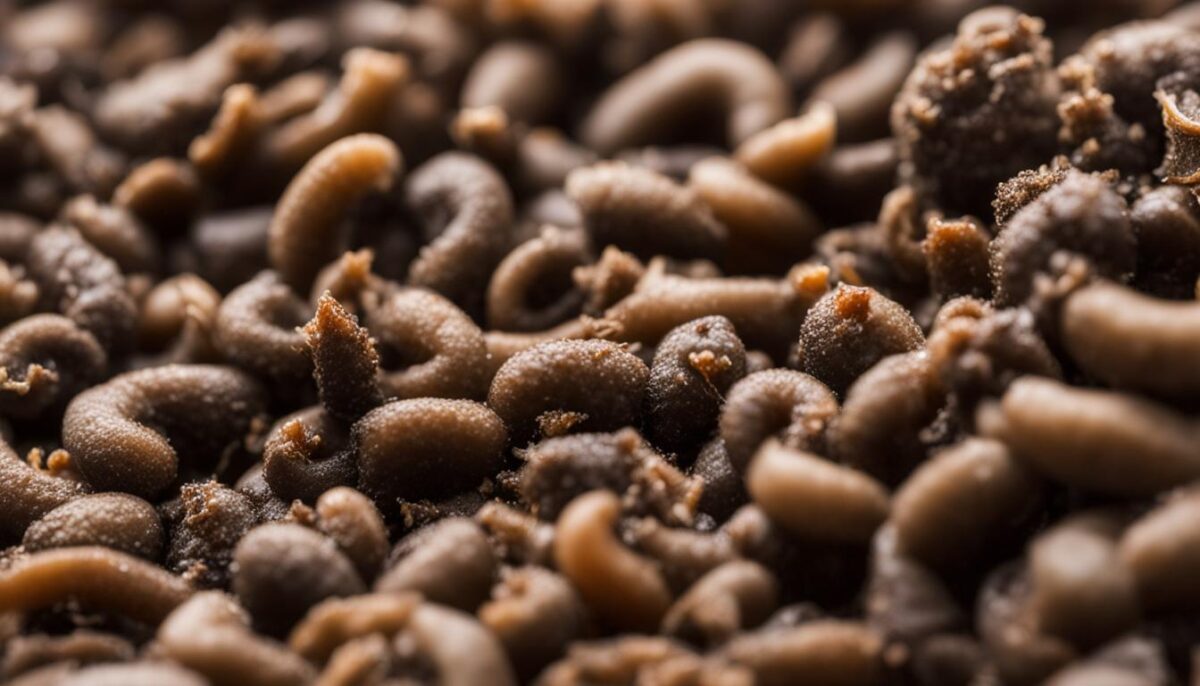
Diagnosis and Symptoms
Diagnosing hookworm infestations in dogs involves a microscopic examination of a stool sample. Veterinarians look for the presence of hookworm eggs, which are too small to be seen with the naked eye. Additionally, dogs infected with hookworms may experience symptoms such as:
- Anemia: Hookworms feed on the blood of their host, leading to a loss of red blood cells and a decrease in oxygen-carrying capacity. This can result in weakness, pale gums, and fatigue.
- Diarrhea: Hookworm infestations can cause chronic or intermittent diarrhea in dogs, which may contain blood or appear dark and tarry.
- Poor growth: Puppies infected with hookworms may fail to thrive, experiencing stunted growth and a lack of appetite.
- Weight loss: Hookworms can interfere with a dog’s ability to absorb nutrients, leading to weight loss despite a normal or increased appetite.
It’s important to note that some dogs may not show any symptoms even if they are carrying hookworms. Regular fecal exams are necessary to detect and treat these parasites.
Treatment and Prevention
Deworming medications are commonly used for the treatment of hookworm infections in dogs. These medications target both adult worms and newly developed larvae. It’s usually necessary to administer multiple rounds of treatment to ensure effective eradication of the infestation. Your veterinarian will determine the appropriate deworming regimen based on the severity of the infection and the individual needs of your dog.
| Treatment | Recommendations |
|---|---|
| Medication | Deworming medications prescribed by a veterinarian should be administered as directed to eliminate hookworms. |
| Prevention | Preventive measures, such as regular fecal exams and maintaining a clean living environment, can help prevent hookworm infections in dogs. |
| Hygiene | To reduce the risk of transmission, practice good hygiene, such as proper disposal of dog waste and washing hands after handling infected animals. |
By taking proactive measures to treat and prevent hookworm infestations, you can help safeguard the health and well-being of your furry companion.
Whipworms in Dogs
Whipworms are a type of worm that resides in the cecum and colon of dogs. These parasites can be contracted by dogs when they ingest infected substances such as soil, food, water, feces, or animal flesh. Whipworm eggs are shed in the feces and can contaminate the environment, where they can survive for up to five years. This makes proper sanitation and hygiene essential in preventing whipworm infestations.
While mild cases of whipworm infection may not cause noticeable symptoms, severe infestations can lead to inflammation of the cecum and colon, resulting in weight loss, diarrhea, and anemia. Whipworms can also cause intestinal blockage in some cases.
Diagnosing whipworms in dogs is done through a fecal sample analysis. A veterinarian will examine the sample for the presence of whipworm eggs under a microscope. It’s important to note that whipworm eggs may not be consistently shed in the feces, so multiple samples may be necessary for a definitive diagnosis.
If whipworms are found, a treatment plan will be recommended based on the dog’s individual needs. Deworming medications specifically targeting whipworms will be prescribed. It is essential to follow the recommended treatment regimen and continue regular fecal exams to monitor the dog’s progress and ensure the elimination of the parasite.
| Whipworms in Dogs | Treatment Plan |
|---|---|
| Diagnosis | – Fecal sample analysis for whipworm eggs – Multiple samples may be required |
| Treatment | – Prescription of deworming medications specifically targeting whipworms – Follow the recommended treatment regimen |
| Monitoring | – Regular fecal exams to assess progress and ensure elimination of whipworms |
| Prevention | – Practice proper sanitation and hygiene – Avoid ingesting or contact with contaminated substances |
Conclusion
Finding dead worms in your dog’s poop can be concerning, but it is important to take immediate action to address and prevent worm infestations. Regular fecal exams are crucial for identifying intestinal parasites in dogs and ensuring their well-being. Proper sanitation and hygiene practices, such as cleaning up your dog’s stool promptly, can help prevent the spread of worms and protect both your dog and your family.
Preventive measures play a vital role in maintaining your dog’s health. Flea prevention is essential, as fleas can transmit tapeworms to your dog. Regular use of flea prevention products can help keep your dog free from fleas and reduce the risk of tapeworm infestations. Additionally, regular deworming medications prescribed by your veterinarian can help eliminate and control worms in your dog’s system, providing added protection.
To ensure the well-being of your furry companion, it is important to consult with your veterinarian for personalized recommendations. They will guide you on the best preventive measures and deworming schedules for your dog based on their specific needs and lifestyle. By maintaining a proactive approach and staying vigilant, you can help keep your dog free from worm infestations and ensure their overall health and happiness.
FAQ
What does finding dead worms in my dog’s poop indicate?
Finding dead worms in your dog’s poop can indicate the presence of intestinal parasites.
What are the types of worms that commonly affect dogs?
The types of worms that commonly affect dogs include roundworms, tapeworms, hookworms, whipworms, and heartworms.
What symptoms can worms cause in dogs?
Worms can cause symptoms such as diarrhea, abdominal pain, weight loss, vomiting, poor coat appearance, pot-bellied appearance, lethargy, dehydration, and blood in the stool.
What are roundworms and how do they affect dogs?
Roundworms are the most common intestinal worms in dogs and can be transmitted to humans. They can lead to poor growth and even death in severe cases if left untreated.
How do dogs get tapeworms?
Dogs can acquire tapeworms by ingesting infected fleas or by consuming wild animals infested with tapeworms.
What are hookworms and how do they affect dogs?
Hookworms are intestinal parasites that can cause anemia in dogs, especially in puppies. They can be transmitted from a mother dog to her puppies and can also infect humans.
What are whipworms and how do they affect dogs?
Whipworms are worms that reside in the cecum and colon of dogs. They can cause inflammation, weight loss, diarrhea, and anemia in severe cases.
How can I prevent and address worm infestations in my dog?
Regular fecal exams, proper sanitation, and hygiene practices are crucial for identifying and treating worm infestations in dogs. Preventive measures such as flea prevention and regular deworming medications can also help protect your dog’s health. Consult with your veterinarian for personalized recommendations.
Can worms in dogs be transmitted to other dogs and humans?
Yes, some types of worms in dogs, such as roundworms and hookworms, can be transmitted to other dogs and humans.
What should I do if I find dead worms in my dog’s poop?
If you find dead worms in your dog’s poop, it is important to consult with your veterinarian for proper diagnosis and treatment. Your veterinarian will recommend appropriate deworming medications and preventive measures.
